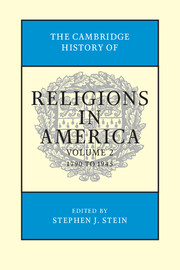Book contents
- Frontmatter
- Contents
- Contributors
- Editor's Introduction
- SECTION I RELIGION IN NORTH AMERICA
- SECTION II RELIGIONS IN THE NEW NATION, 1790–1865
- SECTION III CHANGING RELIGIOUS REALITIES
- SECTION IV RELIGIOUS RESPONSES TO MODERN LIFE AND THOUGHT
- SECTION V COMPARATIVE ESSAYS
- SECTION VI RELIGION AND DIVERSE AREAS
- 34 Religion and Literature, 1790–1945
- 35 Religious Music: A Mirror and Shaper of American Christianity
- 36 Religion and the News
- 37 Religion and the Media, 1790–1945
- 38 Religion and the Courts, 1790–1947
- 39 Religion and Patriotism in America, 1790–Present
- Index
- References
35 - Religious Music: A Mirror and Shaper of American Christianity
from SECTION VI - RELIGION AND DIVERSE AREAS
Published online by Cambridge University Press: 28 July 2012
- Frontmatter
- Contents
- Contributors
- Editor's Introduction
- SECTION I RELIGION IN NORTH AMERICA
- SECTION II RELIGIONS IN THE NEW NATION, 1790–1865
- SECTION III CHANGING RELIGIOUS REALITIES
- SECTION IV RELIGIOUS RESPONSES TO MODERN LIFE AND THOUGHT
- SECTION V COMPARATIVE ESSAYS
- SECTION VI RELIGION AND DIVERSE AREAS
- 34 Religion and Literature, 1790–1945
- 35 Religious Music: A Mirror and Shaper of American Christianity
- 36 Religion and the News
- 37 Religion and the Media, 1790–1945
- 38 Religion and the Courts, 1790–1947
- 39 Religion and Patriotism in America, 1790–Present
- Index
- References
Summary
Music offers an often-neglected lens on the beliefs and practices of American religion. The popular religious music of a majority of Americans for most of American history was Christian hymns. They are the most widely shared ritual texts, and their lyrics express formal and popular theology more effectively than any other body of literature. Rich in all biblical metaphors, Protestant hymns popularized the phraseology of the Authorized (King James) Version. They have influenced both the texts and musical style of American secular music, and some (like “Amazing Grace”) have found a place in popular culture. Hymn singing helps immigrants preserve identity, but also eases adaptation to new surroundings. The slave experience gave a particular character to African American religious music. Participants in homegrown American religions like Shakers, Latter-day Saints, or Christian Scientists, meanwhile, produced hymnals that set their own convictions and aspirations to music that mirrored the style of established Christian hymnody. Catholics brought vernacular hymns and the rich musical content associated with the Latin Mass. Jews carried along their own accumulated musical traditions to the United States. American-lived religion features religious music, and disagreements about what to sing and how to sing it have historically provoked some of religious communities' most bitter controversies.
- Type
- Chapter
- Information
- The Cambridge History of Religions in America , pp. 770 - 791Publisher: Cambridge University PressPrint publication year: 2000



